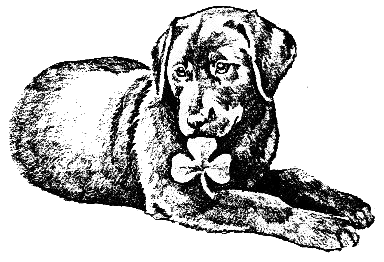 |
Shannondoah
Kennels
'Labrador Retrievers' BREEDING QUALITY LABRADOR RETRIEVERS SINCE 1977 |
Frequently Asked Questions
Should I purchase
my new puppy from a local responsible breeder or a pet store?
Over the past several years, all of the major television networks
have broadcast stories about the “Puppy Mills” that supply puppies to a
lot of the pet stores in the United States. You should take the time and
have the opportunity to visit the breeder and what care is given with each
litter of puppies. You should see the mother of the litter and have the
opportunity to ask question. It’s always better to deal with responsible
breeder. Check with your local veterinarian, who may have a list of breeders.
It’s time to put an to put an end to newspaper headlines like:
“Dozens of puppies found in overheated truck” Nashville, Tenn. (AP) – “About 150 purebred puppies destined for pet stores
were found overheated in a broken-down cargo truck. Four died, and others
were feared exposed to the deadly parvo virus… The truck driver, who was not identified, was charged with cruelty
to animals and inhumane transport conditions… He told authorities he picked up the puppies at Do Bo Tri Kennels
in Purdy, Mo. Some were headed to pet stores in Tennessee, Florida, and
Georgia, while others were supposed to go to airports for shipments to pet
stores on the East Coast.”
How do I go about
selecting a puppy?
(See our first article:
Selecting a Puppy in our Training Tips section.)
How much should I
feed my puppy?
We recommend feeding:
3 meals per day 7 weeks – 4 months.
2 meals per day 4 months
– 6 months.
1 or 2 meals per day 6 months
– adult.
Divide the food evenly
into three meals: 2 cups per day for 7-week pup. At 6 months of age, your
puppy will probably be eating 5 – 8 cups per day. Less if the puppy is getting
too heavy. Excess weight is not healthy or good for dog’s high growth period.
Whatever your puppy does not eat in 5 minutes, pick up and throw away. Do
not feed the puppy again until
the next scheduled feeding. Also, have plenty of clear fresh drinking water
available.
When should I take
my puppy for its first visit to the veterinarian?
We ask the new owners to see their local veterinarian within
three days (72 Hrs.) of purchasing and picking up the puppy. This first
visit to the vet is so that the new owner can receive a general check up
(a clean bill of health) on their puppy and establish a schedule
for the remainder of the puppy vaccinations. Do not expose your puppy
to other dogs anywhere until the series of permanent puppy shots is complete.
The new owner should also take a stool sample to the vet for a final worm
check.
Should I crate train
my puppy?
(See our second article:
Puppy Housebreaking & Crate Training
in our Training Tips section.)
Should I plan on breeding
my dog?
If you plan on breeding a puppy you have purchased from us, we
would like to be contacted. Before breeding any dog, it should have an OFA
hip x-ray that’s certified normal (ask your vet to take one and have it
sent to OFA for certification) and an eye clearance by a canine ophthalmologist.
If the dog does not pass these tests, it should not be bred, as it will
only pass on these problems to its offspring. The mate you choose for your
dog should also have its hips and eyes cleared in the same way. Before breeding
any dog, it is also necessary to decide whether you have the time and facilities
to provide properly for a litter of puppies, as well as your dog truly is
breeding quality.
Much thought should be given to selecting the proper mate for
your dog. Get advice from a knowledgeable person or vet first.
Does Shannondoah
Kennels offer a guarantee on hips
and eyes?
We will replace or refund the purchase price of the field trial
or hunt test quality puppy that has been purchased with a fill guarantee
against hereditary debilitating hip dysplasia, retinal dysplasia or cataracts,
up to 28 months of age. OFA certification can be obtained at 24 months of
age. In all cases, we will require that the original puppy be spayed or
neutered. This would be at the owner’s expense. Hip dysplasia is thought
to be genetic, nutritional and environmental. Remember: A fat puppy
is not a healthy puppy! You can help your puppy by feeding a good diet,
keeping the puppy trim and watching the excessive pounding and stress on
the joints during the first year. (See complete Guarantee)
The above guarantee is canceled once the dog is used for breeding,
or transfers ownership. As we no longer feel obligated to replace such an
animal.